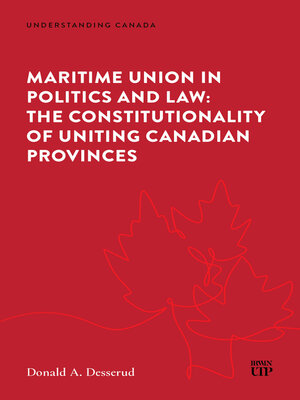Maritime Union in Politics and Law
ebook ∣ The Constitutionality of Uniting Canadian Provinces · Understanding Canada
By Donald A. Desserud

Sign up to save your library
With an OverDrive account, you can save your favorite libraries for at-a-glance information about availability. Find out more about OverDrive accounts.
Find this title in Libby, the library reading app by OverDrive.



Search for a digital library with this title
Title found at these libraries:
| Library Name | Distance |
|---|---|
| Loading... |
The near win of the separatist forces in Quebec in 1995 resulted in a reference case which asked, basically, if and how the Canadian Constitution could deal with a province determined to separate. The Court's ruling established a refined jurisprudence concerning how constitutions can deal with profound change. Maritime Union, a topic that dates back to Confederation, would also profoundly change the Constitution.
This book explores the arguments for and against Maritime provinces coming together and why this perennial debate has yet to be settled. Understanding why this is the case will help us better understand the nature of Canadian federalism; constitutional reform in Canada, particularly at the provincial level; and the concepts of regionalism and identity, words used far too loosely in studies of Canada.
This book is divided into three parts. Part One: Leadership, Adaptability, and Maritime Union, includes chapters on Confederation, Maritime Rights, and the Maritime Union Movement of the 1960s and 1970s. Part Two: Maritime Union and the Canadian Constitution, focuses on Sections 16, 41, 42, 43, and 45. Part Three: For and Against has chapters on the notion of federalism as a social contract, representation, and the reasons Maritime Union has not happened.







